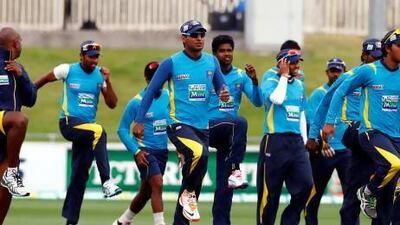In a career that spanned 18 years and 133 Test matches, Muttiah Muralitharan played just five in Australia.
One of them was for the ICC World XI in the Super Series Test that turned out to be anything but super.
The four games for Sri Lanka were played at Perth, Melbourne, Brisbane and Hobart in two tours separated by 12 years.
In between, when Sri Lanka played in Darwin and Cairns (2004), he refused to tour, angered by constant insinuations about his bowling action, including one flippant remark from John Howard, then Australia's prime minister.
Some will say it was mere coincidence, but the cynics will tell you that it was no surprise that Sri Lanka never played in spin-friendly Sydney or Adelaide during Murali's golden years.
Whether that would have improved their record - they have eight wins and two draws in 10 Tests in Australia dating back to 1988 - is a moot point, given the strength of the home side in those days.
Now, with Murali gone - he is still on show in the Big Bash, with the Melbourne Renegades - and Australia having slipped from the highest perch, we have a three-Test series that is as much about transition and looking to the future as it is about current ranking points.
Sri Lanka are rank outsiders, especially given how their results have deteriorated since Murali quit the game with an 800th Test wicket.
Rodney Hogg, the former Australian fast bowler, has already called their pace attack the worst to tour the country. Nuwan Kulasekara, Shaminda Eranga and Chanaka Welegedera are not exactly rapid, but if the conditions are as bowler-friendly as they were in Hobart last year - Doug Bracewell bowled New Zealand to a sensational victory, despite a brilliant David Warner hundred - they are well capable of doing damage.
In Rangana Herath, they have one of the most astute and accurate spinners in the modern game, someone who spent years on the sidelines watching Murali before getting a recall while he was playing league cricket in England.
Those that mock the Sri Lankans would do well to remember how they upset South Africa in Durban last year.
But if they are to perform a similar giant-killing feat in Hobart, Melbourne or Sydney, it is the batsmen that will need to come good.
There have been isolated highlights - Aravinda de Silva's 167 in Brisbane in 1989 and Kumar Sangakkara's 192 in Hobart five years ago - but as a unit Sri Lanka have seldom put enough runs on the board to trouble Australia.
Now, with Australia's pace attack in a state of constant flux, this might be their best chance, even if the stalwarts are all in their mid-30s.
Pat Cummins and James Pattison are already out for the season, Josh Hazlewood broke down without even playing South Africa in Perth, and Peter Siddle and Ben Hilfenhaus are back in the fray after their exertions in the agonising draw at Adelaide.
Nathan Lyon is unlikely to trouble batsmen so used to quality offspin, and it may need the intelligence and subtle variations of Shane Watson to supplement the new-ball efforts.
But just as Sri Lanka are facing up to a future without Sangakkara, Tillakaratne Dilshan and Mahela Jayawardene - who will hand over the captaincy to Angelo Mathews after this tour - Australia, too, are facing an uncertain future.
Most have already accepted that Warner will either be a spectacular hit, or a tame miss, and the jury remains out on his partnership with the more prosaic Ed Cowan at the top of the order.
With Ricky Ponting now gone, Watson moves down to No 4, allowing Phillip Hughes to come in at one-drop.
Hughes was tormented by Chris Martin's medium pace in the New Zealand series last year, and has earned a recall only after a great deal of work on enhancing his repertoire of strokes.
Whether he can replicate them with the same success in the international arena remains to be seen. There are concerns, too, about Matthew Wade, the wicketkeeper, whose dropped catch off Faf du Plessis - to be fair to him, he was standing up to the stumps for Hilfenhaus - almost certainly cost Australia victory in the Adelaide Test.
Brad Haddin has been in tremendous form in Shield cricket, but at 35, he is hardly an investment for the future.
Tim Paine was once earmarked as the keeper to watch, but a serious finger injury had stalled his progress. Now that he is back on the circuit, it will be interesting to see how Wade handles the scrutiny.
Sri Lanka's old guard will give it a good go, but that is unlikely to be enough in conditions likely to favour Australia's pace attack.

